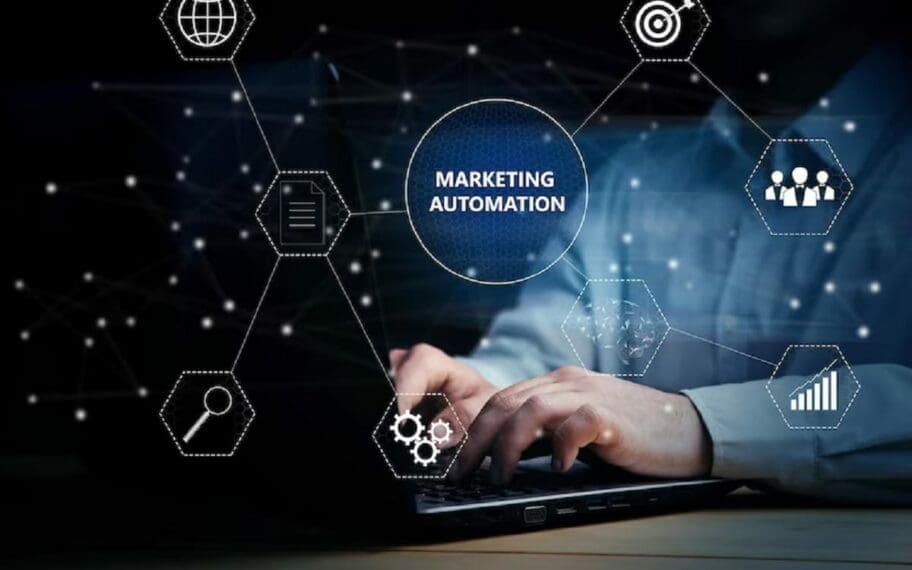In the words of Bill Gates, "Automation applied to an efficient operation will magnify the efficiency." This couldn't be truer in today's digital era where marketing automation platforms, particularly those that automate email, are proving to be game-changers for advanced marketers. With the help of analytics and advanced functionality, these platforms are revolutionizing the field. These platforms, such as social media automation tools and advertising automation tools, are not just about automating marketing processes; they're a comprehensive package that simplifies tasks for marketers, amplifies efficiency, and enhances customer journey automation.

They can even serve as an email automation tool. From crafting a captivating welcome message on your landing pages to managing your product feed in your CRM platform, the best marketing automation platforms like Adobe Marketo Engage and Klaviyo have it all covered. They excel in lead generation and enhancing customer experiences. Social media platforms serve as a powerful marketing hub that significantly impacts customer engagement, product messaging, campaigns, and conversion rates through analytics. It's time we delve deeper into this transformative aspect of modern-day marketing, focusing on product messaging, Adobe Marketo Engage, customer experiences, and analytics.
Understanding Marketing Automation Pricing
We're diving into the nitty-gritty of marketing automation pricing, exploring product messaging, analytics, and Adobe Marketo Engage. From factors that influence the price to hidden expenses, we'll cover all pricing information, including marketing features sourced from various factors.
Factors Influencing Cost
Each platform has its own pricing strategy. The pricing information of a product, like marketing software, is often influenced by numerous factors such as the number of users, features offered, and the scale of its scalability. For instance, you might pay more for saas companies' platforms that support an unlimited number of users, offer advanced analytics, marketing features, and marketing automation tools.
-
Product User Pricing: Some platforms determine their price based on the number of customers who will be using the product system.
-
Features Offered: More features usually mean a higher price.
-
Scalability: SaaS company platforms, designed to grow with your businesses, may come with a heftier product pricing tag.
One-Time Purchase vs Subscription-Based Models
When considering product pricing plans, you'll typically encounter two models businesses often use: one-time purchase price and subscription-based offers.
A one-time product purchase model means shelling out a large amount upfront for the price, but then the customer owns the software outright, with no further pricing involved. On the other hand, subscription-based product pricing models involve businesses paying a recurring price (monthly or annually), which can be easier on cash flow but might end up costing more in the long run.
-
One-Time Purchase: Pay once and own forever.
-
Subscription-Based: Regular payments keep your access active.
Hidden Costs to Consider
Like a product plan, what you see is just part of the story. Always read reviews and consider customer feedback. In product pricing, businesses often face hidden costs like training fees, implementation charges, and upgrade expenses lurking beneath the surface of their campaigns.
-
Training Fees: In your business plan, you might need to account for extra pricing for customer and staff training.
-
Pricing Plan Implementation Charges: Setting up new automation tools for businesses can sometimes incur additional costs.
-
Upgrade Expenses: As your business needs grow and change, you may need to pay for pricing upgrades. However, these could have disadvantages for your customer.
Cost-effectiveness vs Features Offered Analysis
It's not always about finding the cheapest tools; competitive pricing doesn't necessarily equate to value. Always read reviews to understand the advantages from a customer's perspective. You need to consider the pricing of marketing automation software tools in relation to the features they offer for SaaS companies. A pricier software platform might offer more bang for your buck if it comes packed with useful pricing tools that can streamline your businesses' operations and boost your marketing efforts.
Importance of Budgeting
Allocating a specific budget for a marketing automation platform, a crucial tool for SaaS companies, is vital, especially considering the pricing of such software. Marketing automation software helps businesses avoid overspending and ensures they're investing wisely in tools that will genuinely benefit their operations. This is crucial for SaaS companies when it comes to pricing strategies.
Exploring Top Marketing Automation Platforms
Software-based marketing automation tools, including email, are the backbone of any successful marketing campaign for businesses, considering their pricing. Let's dive into some leading businesses and their unique selling points in pricing and marketing automation tools.

Leading Market Players in the Industry
The SaaS marketing automation industry for businesses is a crowded place with many big names, all with varying email pricing structures. HubSpot, Mailchimp, and Marketo are just a few top dogs in marketing automation that have made a name for themselves as essential tools for businesses, especially in email marketing.
HubSpot is known for its all-in-one approach. This SaaS covers everything from email marketing automation to social media tools under one roof, all within an affordable pricing range.
Mailchimp began as an email marketing tool but has since expanded into other areas, including saas, automation tools, and competitive pricing structures. This SaaS now offers marketing automation tools like landing pages and customer journey mapping, all included in the pricing.
Marketo shines in B2B marketing. Its robust features make it a key SaaS tool in marketing automation, catering to businesses looking to nurture leads and build lasting relationships through email.
Unique Selling Points of Each Tool
Each of these SaaS platforms brings unique tools and pricing to your email table.
-
HubSpot: Known for its comprehensive suite of SaaS tools, including marketing automation and email, perfect for businesses wanting a unified platform with competitive pricing.
-
Mailchimp: Offers advanced email marketing features coupled with user-friendly design tools, saas automation, and competitive pricing.
-
Marketo excels in lead management and marketing automation, making it ideal for B2B companies. It offers competitive email services at attractive pricing.
User Interface and Ease-of-Use Comparison
When it comes down to user-friendliness in marketing automation, HubSpot takes the cake with its email features and competitive pricing. Its intuitive interface makes navigating through different functionalities such as marketing automation, email services, and pricing strategies a breeze.
Mailchimp, a marketing automation tool, also boasts an easy-to-use email interface but its extensive features list and pricing can be overwhelming.
Marketo, on the other hand, requires more technical know-how due to its complex marketing automation nature geared towards larger enterprises with a different pricing structure.
Integration Capabilities Across Platforms
Integration capabilities are crucial when choosing an automation tool. All three marketing automation platforms offer integration options with popular CRM systems like Salesforce and Microsoft Dynamics, along with competitive pricing.
However, in terms of marketing automation, HubSpot stands out by offering over 500 integrations, including Shopify and WordPress, at competitive pricing.
Customer Support Quality Comparison
Customer support and pricing are vital factors when choosing your marketing automation platform. All three provide support via phone, email, and live chat for pricing and marketing automation queries.
HubSpot, known for its excellent customer service and marketing automation, offers 24/7 support and competitive pricing. Mailchimp, a marketing automation tool, offers an extensive knowledge base but lacks phone support, despite its pricing. Marketo's marketing automation, while offering comprehensive support and competitive pricing, has been criticized for slower response times.
Comparative Review of Highlighted Platforms
We're diving deep into the best marketing automation platforms. We'll compare pricing and features, evaluate performance metrics in marketing automation, analyze user reviews and ratings, assess scalability potential for growing businesses, and examine the security measures each platform offers.

Feature-by-Feature Comparison
Each platform offers a plethora of advanced features. HubSpot's marketing automation dashboard is known for its ease of use, versatility, and competitive pricing. Marketing automation allows you to manage your social profiles across different networks from one place, potentially impacting pricing strategies. In contrast, Marketo, a marketing automation tool, focuses on lead management with comprehensive tools to track customer interactions and pricing strategies.
-
HubSpot: Offers marketing automation, pricing options, social media management, content creation tools, SEO optimization.
-
Marketo
"Marketing Automation for B2B & SaaS Companies"
Specific Benefits for B2B Companies
Pricing-focused marketing automation platforms are a game-changer for B2B companies. They provide immense benefits of marketing automation, such as improved customer engagement, enhanced lead generation, and competitive pricing.
-
Adobe Marketo, a leading marketing automation software, offers features like predictive content, account-based marketing, and competitive pricing. These marketing automation functionalities help to personalize the customer experience and target leads more effectively.
-
HubSpot Marketing Hub is another automation tool that's popular among B2B marketers. It comes with automation features like email tracking and automated workflows that can streamline your marketing efforts.
Role in Streamlining Sales Funnel in SaaS Businesses
Marketing automation plays a crucial role in streamlining the sales funnel for SaaS businesses.
-
With automation tools like Adobe Marketo or HubSpot, you can automate repetitive tasks such as email marketing or social media posting. This gives your sales team more time to focus on closing deals, thanks to marketing automation.
-
Moreover, these platforms come with analytics features. They provide insights into how potential customers interact with your brand through marketing automation, helping you fine-tune your sales strategies.
Case Studies Showcasing Successful Usage
There are numerous case studies showing how businesses have successfully leveraged marketing automation platforms.
-
For instance, small business XYZ experienced a 30% boost in lead generation after implementing Adobe Marketo's predictive content feature, a key component of marketing automation.
-
Similarly, SaaS company ABC reported a 20% boost in customer retention rate within six months of using HubSpot’s marketing automation features, particularly the automated workflows.
Tailored Features Catering Specifically to These Industries
Marketing automation platforms offer tailored features that cater specifically to the needs of B2B and SaaS companies.
-
Adobe Marketo provides automation in account-based marketing, which is particularly useful for B2B companies targeting specific accounts.
-
On the other hand, HubSpot offers integrations with various CRM systems – an essential requirement for many SaaS businesses looking to enhance their customer relationship management efforts through marketing automation.
Impact on Customer Retention Rate
Marketing automation can significantly impact the customer retention rate in B2B and SaaS contexts.
-
By implementing automation in routine tasks, your marketing team can focus more on nurturing relationships with existing customers.
-
Platforms like Adobe Marketo and HubSpot offer marketing automation features such as personalized email campaigns or targeted social media ads. Marketing automation can help keep your brand at the top of customers' minds, thereby increasing the likelihood of them sticking around.
Role of Analytics in Marketing Automation
Analytics play a pivotal role in marketing automation. Let's delve into the specifics.
Importance of Data-Driven Decision Making
Modern marketing strategies hinge on data-driven decision making. The best marketing automation platforms are those that facilitate this process.
For instance, they help marketers understand customer behavior patterns. This understanding aids in crafting more effective and personalized campaigns through marketing automation.
"Choosing the Ideal Automation Platform"
Making the right choice of a marketing automation platform can be a game-changer for your business. Here's how to ensure you pick the marketing automation tool that fits like a glove.
Key Factors in Selecting a Platform
There's no one-size-fits-all solution. Your choice should depend on several factors.
-
Business Size: If you're running a small business, you might not need all the bells and whistles of a high-end marketing automation platform. A more basic marketing automation option could do the trick without breaking the bank.
-
Industry: Different industries have different needs. For instance, if you're in e-commerce, features like cart abandonment reminders might be crucial for your marketing automation strategy.
-
Budget: The price tag is always important. Some marketing automation platforms offer a free plan or trial period, which can be a great way to test things out before committing.
Aligning with Business Goals
Your chosen automation software should help you reach your marketing objectives and overall business goals. For example, if increasing customer engagement is your priority, look for platforms offering robust email marketing tools, social media integration, and automation capabilities.
Assessing User-Friendliness
A good user experience (UX) is key. You don't want to spend hours figuring out how to use your new marketing automation tool when you could be focusing on growing your business instead.
Consider:
-
Learning Curve: How easy is it for beginners? Is there support available?
-
User Interface (UI): Is it intuitive? Does it feel comfortable?
Evaluating Vendor Reputation
The reputation of the vendor matters too. Look at reviews and ratings from other users.
Ask yourself:
-
Are they reliable?
-
Do they provide good customer service?
-
What about after-sales support?
Trial Periods and Demos
Before going full throttle with any marketing automation platform, take it for a spin first! Most vendors offer demos or trial periods. This is a chance to see if the marketing automation platform meets your needs and if it's a good fit for your team.
Embracing Effective Marketing Automation
Let's cut to the chase, you've got a business to run and we're here to help with marketing automation. We've explored the ins and outs of marketing automation platforms – from understanding pricing models, diving into top tools, comparing highlighted platforms, discussing their role in B2B & SaaS companies, and even delving into the crucial role of analytics. Now it's your turn to take action.
Choosing the right marketing automation platform can be like finding a needle in a haystack but remember - the perfect fit for your business is out there. Don't be afraid to experiment with marketing automation until you find 'the one'. Now go forth and automate! And hey, if you need more insights on marketing or have any questions about automation—give us a shout. We're always here to lend a hand.
FAQs
What are some key factors I should consider when choosing a marketing automation platform?
When selecting a marketing automation platform, consider its ease of use, integration capabilities with existing systems, scalability as your business grows, pricing structure (including any hidden fees), customer support availability and quality.
How can marketing automation benefit my small business?
Marketing automation can streamline your marketing efforts by automating routine tasks such as email campaigns or social media posts. This not only saves time but also ensures consistency in your marketing communications and helps nurture leads effectively.
Is it possible to switch between platforms if I'm not satisfied?
Yes, most marketing platforms allow data exportation so you can switch providers if needed. However, transitioning could require significant marketing effort depending on how deeply integrated the platform is within your operations.
Can I try these platforms before making a purchase decision?
Most reputable marketing automation platforms offer free trials or demos allowing you to test their features before committing financially.
Are there any hidden costs associated with these platforms?
Some marketing platforms may charge extra for certain features or services such as premium customer support or advanced analytics. Always read the fine print before making a decision.

Article by
Titus Mulquiney
Hi, I'm Titus, an AI fanatic, automation expert, application designer and founder of Octavius AI. My mission is to help people like you automate your business to save costs and supercharge business growth!
